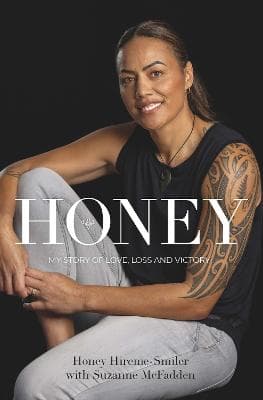Review: Honey, by Honey Hireme-Smiler
Reviewed by Angela Walker
Honey is the story of Honey Hireme-Smiler’s astounding life – from “town bully” to multiple world champion, single mum, and pioneering television commentator.
With one of the most impressive resumes in New Zealand sport, Honey Hireme-Smiler (Ngāti Raukawa, Ngāti Hauā) details her fascinating journey to win four World Cups in rugby and league. While the book is certain to enthral readers typically drawn to sports autobiographies, Honey is far more than a rugby tale.
According to the epigraph, the book is for anyone who doesn’t have it all together but keeps putting one foot in front of the other. Hireme-Smiler reveals her troubled childhood and candidly describes the heart-breaking tragedies that have peppered her life – and almost seems to be saying: If I can prevail, you can too. “It nei; iti nei. Take small steps; little by little it can be done,” the epigraph concludes.
As a young girl, Honey dreams of becoming a league player, and resents not being able to play her favourite sport: “I hated being a girl because I thought it was the biggest barrier to fulfilling my childhood dream.”
Fortunately change is afoot, though Hireme-Smiler’s sporting career kicks off before the advent of professional women’s rugby or the women’s national rugby league (NRLW) competition. But as Hireme-Smiler’s career evolves, so does women’s sport, her story spotlighting a history-making period for women’s rugby and rugby league in New Zealand. On her trailblazing journey, Hireme-Smiler becomes one of the first females to play professional rugby.
Honey is expertly written by award-winning journalist Suzanne McFadden, founding editor of LockerRoom, the news site devoted solely to women in sport in Aotearoa. McFadden has skilfully extracted Hireme-Smiler’s story and captured her distinctive voice on the page, leaving no doubt that it’s Honey telling her story in her words.
It’s a story artfully woven with themes of resilience, redemption, identity and belonging. Hireme-Smiler’s upbringing is the antithesis of privilege, featuring family violence and a low socioeconomic neighbourhood. But there is richness in the love and support her whānau and community wrap around her, Māori values such as whanaungatanga and manaakitanga shining through. It takes a village to raise a sporting superstar, it seems.
Yet the support is far from one way. During the course of her life, Hireme-Smiler – mother, daughter, wife – gives endlessly to her whānau and wider community, too. In one of the book’s most poignant chapters, Hireme-Smiler doesn’t hesitate to leave her NRLW team to nurse her mother through the final weeks of her life: “There was no way I was leaving Mum’s side… I saw that job as a real privilege… That’s our culture… wāhine take care of wāhine – and we were ensuring Mum’s dignity was kept intact.”
Throughout the book, Hireme-Smiler provides thought-provoking insights into her culture and how she squares her values with the demands of elite sport: “Most athletes are honest that you’ve got to be a bit selfish to succeed in sport. I had trouble with that because I wasn’t raised that way. My Māori culture was about always putting others first, especially whānau.”
It's the altruism embedded in her world that partly explains how she’s managed to create a life with so many layers; a mother competing on the world stage in rugby union, rugby league and rugby sevens for nearly two decades while juggling a succession of wide-ranging jobs, from youth worker to hospice kaiāwhina (carer). One of the superpowers fuelling her is self-belief. “Mauria te pono wahine mā! Believe in yourselves ladies!” she tells her teammates.
Hireme-Smiler says she was reticent to tell the unvarnished story of her life to date. Her initial reaction to the idea was: “Hell no, people will freak out if they know the real me.” Fortunately, she was persuaded to share her story. And the result is exactly as she says: “The good, the bad, the ugly, but most importantly, to educate, inspire and empower others.”
Reviewed by Angela Walker
